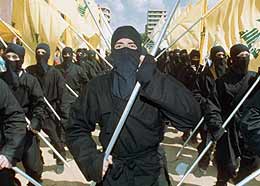 The dark shadows of Mount Lebanon run along the asphalt road as the car heads to the ancient city of Baalbeck, where the exquisitely carved ruins of Roman temples still stand.
The dark shadows of Mount Lebanon run along the asphalt road as the car heads to the ancient city of Baalbeck, where the exquisitely carved ruins of Roman temples still stand.
The car slows in a traffic jam at one of the main intersections, not far from Roman columns that were once the entrance to the temple of Jupiter. Men from the drug squad, armed with machine guns and faces hidden by masks, search every car for caches of the marijuana, hashish and opium that has been grown in this fertile valley for centuries.
Baalbeck is a city known for lawlessness. It is also known as a stronghold of Hezbollah, the Lebanese Shiite Muslim militant organization supported by Syria and Iran that has carried out terror attacks against U.S. targets and wars with Israel.
Portrayed by its leaders as the protector of ordinary Muslims, that image is contradicted by its standing by mutely as its patron Syria kills fellow Muslims to preserve a dictatorship, say critics.
“Hezbollah has taken sides in the conflict,” says Sheikh Sobhi Toufayli, who headed Hezbollah in the 1990s.
When the Arab pro-democracy protests erupted last February in Egypt, Hezbollah applauded them. Hezbollah Secretary General Hassan Nasrallah said his organization Hezbollah was in “solidarity with the Egyptian and Tunisian people and youth.”
“This revolution is the product of the people’s will and determination,” he said. “We are witnessing a complete revolution of the poor, the free, the students.”
Nasrallah also praised the Arab Spring democracy movements in Bahrain, Yemen and Libya. But he has no apparent enthusiasm for the uprising in Syria, where tens of thousands of Muslims are demanding democratic reforms and the ouster of dictator Bashar al-Assad. Nasrallah has even overseen measures to help Assad crush the demonstrators.
“Hezbollah is in a difficult situation,” says Talal Atrissi, professor of sociology at Lebanese University. “The party supported other Arab revolutions because they shared their resistance ideology that inadvertently put an end to regimes known for their pro-American and Israeli sympathies. In Syria, however, the situation is different.”
Syria for years has allowed weapons from Iran bound for Hezbollah in south Lebanon, on the border with Israel, to transit through its country. Thousands of missiles have made it to Hezbollah this way.
Hezbollah had taken advantage of the upheaval in Syria to obtain advanced weapons systems, such as long-range rockets and Russian-made air-defense systems, according to reports in The Jerusalem Post, quoting Western intelligence assessments.
Hezbollah’s support for the Assad regime has not gone unnoticed by Syrian protesters. Recent images from demonstrations in the country show people burning the yellow Hezbollah flag. The Syrian Revolution Coordination Committee has accused Hezbollah of firing Katyusha rockets from Lebanon into the al-Zabadani region of Syria where anti-Assad protests are taking place.
Hezbollah calls the accusations “false rumors,” and Brahim Moussawi, editor of Hezbollah’s magazine al-Intikad, declined to comment. But Shiites here appear to be divided over the matter.
Sitting in his vegetable store close to the opulent Beirut Central District, Mohamad Zaheridine reads a copy of the Koran while watching al-Manar TV, the Hezbollah run station.
“People in Syria and Tunisia are just the same, fighting against tyrants. Syria’s anti-Israeli policies do not make its crackdown on protesters legitimate,” he says.
Electrician Abu Mazen agrees.
“The [Assad] regime does not have the right to quell the protest movement in blood,” he says.
However, Ismail Zeaiter, a member of a powerful Bekaa clan, says his people “will sacrifice our blood and our souls for Bashar.”
“Unrest in Syria is the result of a plot waged against the country and its ally Hezbollah [to put an end] to their fight against Israel,” he says, his forearms covered in intricate tattoos.
If the Syrian regime falls, it will be replaced by a Zionist ally, “and it will be the end for us all,” Zeaiter says.
Layal Zein, a saleswoman in a clothing store nearby, sees the uprisings as the work of the United States and Israel, a claim made often on al-Manar TV.
“Americans and Israelis want to repeat the Iraqi experience to sow regional discord,” she says.
Others in the Shiite community are simply pessimistic about the outcome of the Syrian uprising.
“We have no faith that the protests [in Syria] will produce any real change. One dictator will take the place of the other,” says Ahmad Dakroub, a Hezbollah supporter in Watwat, a Beirut neighborhood.
Dakroub doubts that the downfall of Assad in Syria will make a difference because of what happened in Lebanon when Hezbollah took charge of the government in June.
“Now that we [Hezbollah] are in power, nothing has changed. We still work day and night for a mere pittance. No matter who is in power, politics stays the same,” he says.
Sheikh Toufayli, however, warns that Hezbollah must avoid stirring up divisions between the Sunni Muslims leading the uprising in Syria, who are the majority, and the Shiite Muslim sect known as Alewite that dominates the government. Violence between Sunnis and Shiites has been tearing apart many Arab nations — Iraq and Bahrain among them.
Lebanon itself went through a brutal civil war from the 1970s to the 1990s in which hundreds of thousands of Lebanese were killed or driven into exile. Toufayli says Hezbollah is drawing Lebanon into a conflict that could prompt a return of civil war here.
“I call on Hezbollah to reconsider its approach and unite Sunnis and Shiites. The solution resides in building a true democracy in Syria. Any other approach will only serve enemy interests,” he says.
USA Today
Leave a Reply
You must be logged in to post a comment.